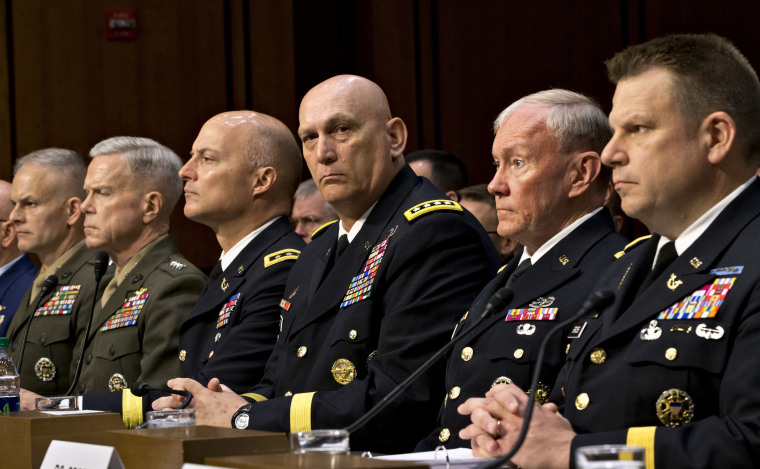In direct opposition to legislation introduced in Congress, top commanders including the Joint Chiefs of Staff on Tuesday strongly opposed removing the prosecution of assault cases in the military from the chain of command.
"If I believe that removing commanders from their central role of responsibility in addressing sexual assault would solve these crimes within our ranks, I would be your strongest proponent," U.S. Army Chief of Staff Generaly Raymond Odierno told the Senate Armed Services Committee Tuesday. "But making commanders less responsible, less accountable, will not work."
After weeks of intense focus on the military sexual assault crisis—which President Obama and Secretary of Defense Chuck Hagel have called a "scourge" —a group of women senators including Kirsten Gillibrand, D-N.Y., Claire McCaskill, D-Mo., and Kelly Ayotte, R-N.H., are leading the Senate hearing in a very public attempt to bring to light an issue that has plagued the nation's military for years. The renewed push highlights the effect of a record 20 women serving in the Senate, and seven women sitting on the influential Senate Armed Services Committee.
In a significant departure from current military law, Gillibrand's proposed legislation would put the decision to try sexual assault cases in the hands of military prosecutors rather than the commanders. Last fall, the superior commander of Air Force Lt. Colonel James Wilkerson unilaterally overturned Wilkerson's conviction of aggravated sexual assault and one-year jail sentence under authority granted to him by the Uniform Code of Military Justice, in a case that outraged lawmakers.
"We have to remove the commanders from any ability to overturn jury verdicts," McCaskill told msnbc's Andrea Mitchell Tuesday. "We need to remove from any consideration anything other than the facts of the case...That's the only way we're going to get these cowards in prison where they belong."
"We shouldn't be taking into account how good a military service member is when we’re assessing the decision to prosecute," McCaskill stressed to military commanders Tuesday.
The top military brass argued in Tuesday's hearing that sidelining commanders in the prosecuting sexual assault cases would undermine leadership and unit cohesion.
"As we consider further reforms, the role of the commander should remain central," said Joint Chiefs Chairman General Martin Dempsey. "Our goal should be to hold commanders more accountable, not render them less able to help us correct the crisis."
"A unit will rise or fall as a direct result of the leadership of its commander," U.S. Marine Corps Commandant Gen. James Amos echoed. "As you consider changes to the military code of justice, I plead with you to do it sensibly and responsibly."
The sole female military commander on the panel, Col Jeannie Leavitt, the Air Force's first female wing commander, agreed. "Our nation has entrusted the lives of our service members to the U.S. military, and ultimately it is commanders who shoulder that responsibility, " she said. "Commanders must have the ability to hold their airmen accountable for their behavior."
Amos continued. "But as strongly as a I support the authority of the commander, I strongly reject the status quo within the current military authority."
Tuesday's hearing—the first serious effort in 10 years to combat a rapidly growing epidemic of sexual assault—marked the first time all members of the joint chiefs and the commandant of the U.S. Coast Guard testified at the same time, according to The Washington Post.
A panel of 11 men and one woman testified before the Senate Armed Services Committee, illustrating a gender disparity that Gillibrand said was endemic to the crisis.
"While you are all so dedicated and determined, not all commanders are objective, not every single commander necessarily wants women in the force, not every single commander believes what a sexual assault is, not every single commander can distinguish between a slap on the ass and a rape because they merge all these crimes together," Gillibrand told the panel.
A recent Pentagon report estimated that as many as 26,000 military service members may have been assaulted last year. According to the report, a small fraction—just 3,374 instances —were reported. Those cases resulted in 238 convictions. The Pentagon also reported a 35% surge in the number of active-duty personnel receiving "unwanted sexual contact" in the past two years.
Senator John McCain told the panel about a conversation he had with a woman, just a night earlier, who asked him if he could give his "unqualified support" to send her daughter into the military.
"I could not," McCain said. "I cannot overstate my disgust and disappointment over the continued reports of sexual misconduct in our military. We have been talking about the issue for years and talk is insufficient."
"This is not a new problem," West Virginia Sen. Joe Manchin told Dempsey Tuesday. "After each instance, leaders said never again or said zero tolerance. What is different this time, if we have history of this and nothing ever being done."
"We have had 12 years of conflict," the chairman of the Joint Chiefs responded. "Frankly, I think I took my eye off the ball."
Watch the hearing live here:
